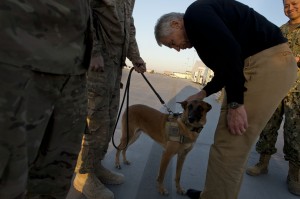Pause in Afghan Presidential Campaign With Death of Vice President; Taliban Vow to Disrupt
Afghanistan’s Vice President Muhammad Qasim Fahim died yesterday, in what the New York Times described as a heart attack. Fahim was a warlord with a checkered past and had ties, through a brother, to the looting and downfall of Kabul Bank. Because of his death, Afghanistan has declared a three day pause in campaigning for next month’s election to replace Hamid Karzai. The Taliban has taken advantage of this pause to warn Afghan citizens against voting and to threaten violence against those who do vote.
The Times brings us more of Fahim’s history:
Though Mr. Fahim was at the center of Mr. Karzai’s government, the two shared a tumultuous history. In the mid-1990s, when Mr. Fahim was in charge of the Afghan intelligence service after the fall of the Soviet-backed regime, he ordered the arrest of Mr. Karzai, then the deputy foreign minister, on suspicion of spying for a rival faction within the government. The future president managed to escape when a rocket hit the prison where he was being held.
Nearly a decade later, Mr. Fahim backed Mr. Karzai’s bid to lead Afghanistan after the Taliban’s fall, and in exchange was named defense minister. But within months, as Mr. Karzai began moving to sideline Mr. Fahim, American officials picked up intelligence that the defense minister was considering an attempt to assassinate the president, according to current and former Afghan and American officials with firsthand knowledge of the episode. To head off the threat, the Americans quickly replaced the Fahim loyalists who were guarding Mr. Karzai with United States Army Rangers.
But they did not replace Mr. Fahim, concluding that the young Afghan government was too weak to risk a confrontation with one of Afghanistan’s most powerful warlords. American and Afghan officials instead settled for vague statements that suggested Taliban threats had led to the bodyguard swap.
Reuters brings us the threat to the election issued by the Taliban:
The Afghan Taliban said on Monday next month’s presidential election was being manipulated by the United States, which had already chosen the winner, and threatened to use “full force” in attacking anyone taking part.
Two campaign workers have already been killed and at least one presidential candidate has been assaulted during campaigning for the April 5 poll, the first democratic transition of power in the country’s history.
The Taliban said the proceedings were being stage-managed by the United States.
“The people should realize that the election will bear no result because the real elections have taken place in CIA and Pentagon offices and their favorite candidate has already been chosen,” the Taliban said in a statement.
“…All fighters are given orders to disrupt this sham elections by full force and bring under attacks election workers, activists, volunteers and those providing security everywhere. If someone takes part in this (election), they will be responsible for the bad consequences themselves.”
What stands out to me in this statement from the Taliban is that they claim the US (through the CIA) has already chosen the winner of the election, but they don’t say which candidate has been chosen. Just last week, Hamid Karzai’s brother withdrew from the campaign and threw his support to the candidate Karzai is said to favor. But this article on that development from The Guardian shows that there is no clear frontrunner and that the Karzais’ chosen candidate has little current backing: Read more →

